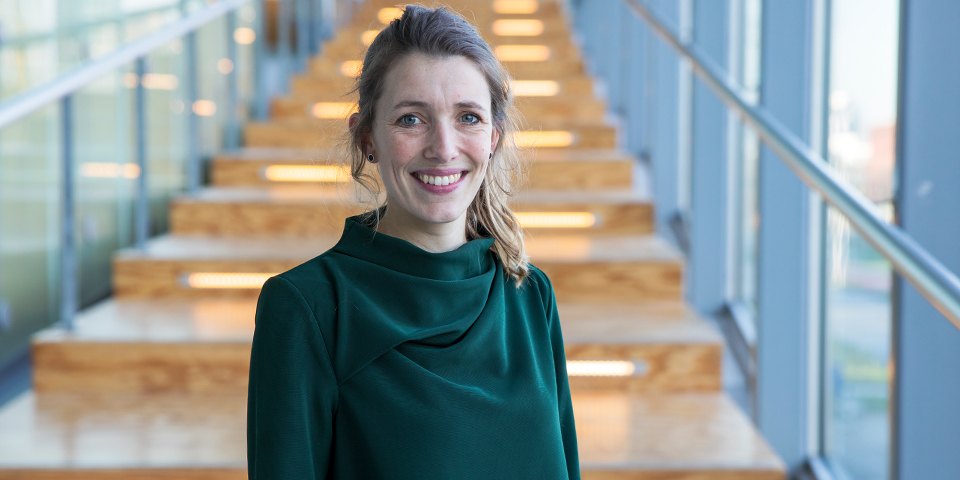Dr. Eline Hutter started as a Tenure Track Assistant Professor of ARC CBBC’s hub in the Weckhuysen group. She will build up a research team within the consortium that will focus on photocatalysis research. Hutter brings in knowledge and experience on the interaction of matter with light and will use that to contribute to the innovative research programme of ARC CBBC.
The scientific career of Eline Hutter
Eline Hutter obtained her PhD cum laude in chemical engineering in 2018 from Delft University of Technology in the Netherlands, where she specialized in time-resolved spectroscopy techniques in the group of Dr. Savenije. In the past years, Eline investigated optoelectronic properties of lead halide perovskites: a class of semiconductors that received tremendous attention in materials science, as these have yielded high-efficiency solar cells, LEDs and X-ray detectors.
In 2017, Eline was a Fulbright Visiting Scholar at Stanford University (USA), where she explored the synthesis of non-toxic halide perovskites. After obtaining her PhD, she joined the group of Dr. Ehrler at AMOLF (Amsterdam, the Netherlands) as a postdoctoral fellow. Here, she used pressure-dependent spectroscopy techniques to investigate the stability of mixed-halide perovskites against phase segregation. In 2019, Eline received a Veni research grant from the Dutch Research Council (NWO) to develop a technique to unravel the band structure of halide perovskites.
Hutter’s ambitions within ARC CBBC
At ARC CBBC, Eline will explore the activity of lead-free perovskite materials as photocatalysts. She will use advanced spectroscopic and structural characterization to investigate the relationship between the optoelectronic and structural properties and the activity and selectivity of perovskites as photocatalysts. The long-term goal is to find non-toxic semiconductor materials that use (sun-)light to deplete in-house and outdoor air pollutants, which could then be used to add unique functionalities to coatings.
Hutter has a strong motivation to understand how materials convert sunlight into free electrons, and how these electrons can be used for electricity (solar cells) or chemical reactions (photocatalysis). Apart from her passion for fundamental research, Hutter also has the ambition to invest her knowledge and expertise in working on sustainable solutions for the chemical industry. Hutter is convinced that only by working together as academic and industrial partners, major steps can be made: “Scientists are the source of new knowledge and together with the industry, this knowledge can be used to generate impactful, sustainable technologies.”
Playing a key role as chemist for a sustainable future
Hutter was recently featured in ACS Energy Letters, which celebrated the contribution of female energy researchers who have published new advances from their laboratories. She shared her story to inspire other scientist working in the fields and states: “After I finished my undergraduate studies in chemistry, I realized that as a chemist you have the opportunity to play a key role in developing new technologies for a more sustainable future, which motivated me to pursue a PhD in photovoltaics.”
Hutter further writes about her most rewarding moments and concludes by saying: “I think it is more important than ever to unite people with different backgrounds and expertise and work together to solve the many global challenges related to energy.” That ambition fits well with the ambition of ARC CBBC, which has the focus on multidisciplinary innovation to design and develop tomorrow’s products and technology. After all, if the chemical industry can make their processes and products more sustainable, this will have significant impact on the whole society.
Source: website ARC CBBC

